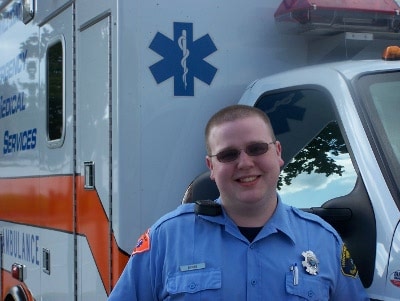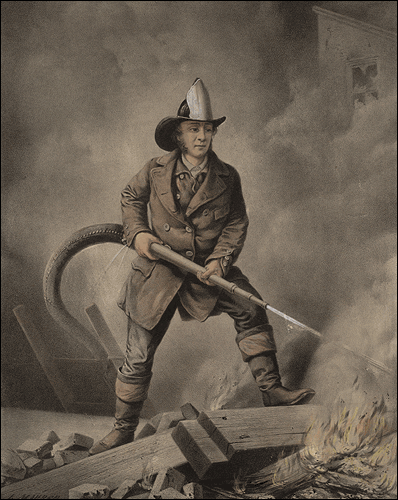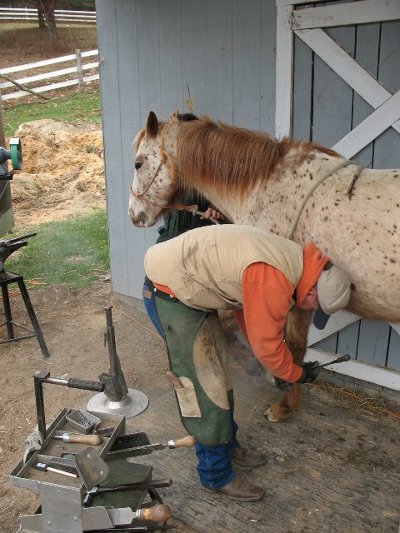
Once again we return to our So You Want My Job series, in which we interview men who are employed in desirable jobs and ask them about the reality of their work and for advice on how men can live their dream.
Today we hear from Nate Dionne, an EMT who works for the busiest EMS system in South Carolina. He gives us a look at the job of our vital first responders.
1. Tell us a little about yourself (Where are you from? How old are you? Where did you go to school? Describe your job and how long you’ve been at it, etc).
I am 21 years old and originally from New Hampshire, although I now live and work in South Carolina. I began as a volunteer EMT-Basic in NH and moved to a busier system for the experience. I have been an EMT for over 3 years now. I now work for the largest and busiest system in South Carolina. In a nutshell, EMT’s treat the sick and wounded. This can range from “Oh my leg’s hurt for 3 weeks and I’m out of pain meds” to heart attacks, to mass casualty incidents where hundreds of people can be involved.
2. Why did you want to become an EMT? When did you know it was what you wanted to do?
I began as a volunteer firefighter, and began volunteering for my town’s ambulance as well. I enjoyed volunteering because I felt like I was part of something bigger than myself, something important, and because I was giving back to my hometown. I liked being both a firefighter and EMT, but soon I began to love EMS. I thought that doing it for free was nice, but getting paid to do it would be even better. I feel fortunate that I found a career I love while I was so young.
3. Is there a hierarchy in your job? Can you move up to different positions and what are those positions?
There are 3 different levels of EMT, Basic, Intermediate and Paramedic. EMT-Basics can take vitals, splint broken bones, bandage wounds, and administer oxygen. At the EMT-Intermediate level, you can do all of that plus start IV’s, administer fluids, and medicine to help diabetics whose blood sugar dropped too low. Some Intermediates are allowed to push certain cardiac medications and defibrillate (shock the heart). EMT-Paramedics do all of that, plus intubate (place a tube in the trachea to secure an airway), push more medications than I can possibly list, use a cardiac monitor to determine a heart rhythm and treat accordingly, and so on. With higher certification levels come more capabilities, and more responsibility.
There is usually room for advancement. There is always a rank structure which mirrors that in any other line of work. Your supervisors may be called a manager or simply supervisor or have a rank. We follow a somewhat military structure; we have 3 sergeants under a lieutenant for each shift.
4. If a man wishes to become an EMT, how should he best prepare? What is the training for EMT’s like? Do you need a degree? Are there special schools or EMT programs within a school?
Usually technical colleges are the places to find paramedic programs, where you can get all of your classes, from EMT-Basic to Paramedic. There are often EMT classes available through local EMS services or agencies. Technical colleges offer an associates degree in Emergency Medical Technology along with your Paramedic certification. Having a degree often means more pay from the start (at my service having a degree gets you an extra 5%, but it varies.) The training ranges from a couple of months (EMT-B and EMT-I) to about 2 years (EMT-B through Paramedic.) I am currently an EMT-I, and when I go back to school for my Paramedic certification, I face another year of classes.
5. Once you obtain the proper training, how do you go about finding a job?
Many services post on job-finding websites. Or look on the website of the service you’re interested in. I found out my service was hiring by word of mouth. But if you look, they’re not hard to find.
6. What’s the job market like for EMT’s? How hard/easy is it to land a job?
I’ll begin by saying there is a shortage of Paramedics in almost every part of the country. With many 911 services, they are looking for Paramedics, so it may be harder to find a job as an EMT-B or I. There are private services all over the country. Private services do non-emergent work, meaning they take elderly or chronically ill patients to doctors appointments, dialysis etc. Some private services have contracts with municipalities or other local governments to run their 911 response as well. Many towns have their own ambulance; sometimes the fire department and EMS are one in the same. Others are called “3rd service,” which is what I work for. We are owned and operated by the county, as opposed to a town or a private service. Jobs are often very competitive, especially with high-profile services. If you’re looking to make lots of money, you’re looking at the wrong profession. Most EMT’s don’t get paid well at all. Paramedics can make decent money, but it depends on where you work and your years of experience. Many EMT’s and Paramedics work two (or more) jobs.
7. What’s the retention rate like for your job? What qualities do EMT’s have that stick with the job and excel at it?
Many EMT’s and Paramedics work for the same systems their whole careers. Others jump around a lot before they settle down. Working in an emergent (911) system is pretty much recession-proof, especially when you work for a municipality or other government-type. You have to be in decent physical shape, as you need to lift patients, carry heavy equipment up flights of stairs or over long distances. To be a successful EMT you need to very dedicated to your profession; medicine is an ever-changing field, and it takes a lot of work to keep up with new equipment and techniques. People call EMS when they are gravely ill or injured, so compassion and understanding are big parts of what we do. You must be able to keep cool under pressure; remember, you are walking towards chaos while everyone else is running away.
8. There are other public service jobs that are somewhat related to your field of work-nurse, firefighter, police officer. What makes a man choose to become an EMT over other options?
Where I’m from, being a firefighter and an EMT or Paramedic are often one and the same. I would like to eventually move home and be a FF/EMT, but I need experience first. In systems where the two are separate, many people choose EMS over police or fire because, quite frankly, we make more money. In most systems, Paramedics make more than police officers or firefighters. Nurses make more money than Paramedics, but many of us stay in EMS because we enjoy being in the field, rather than the hospital. We are the first responders, the first on the scene. We treat and stabilize patients, then deliver them to the ER doctors and nurses.
9. What is the best part of your job?
The satisfaction of helping someone. To be honest, it’s not like TV, where we save a life every day. The calls where you make a difference between life and death are few and far between. But when you do, it is a wonderful feeling. It feels like your whole career is worth that one save.
10. What is the worst part of your job?
The abuse of the system. People call 911 all the time for things that do not require an ambulance. Some are lonely older folks who have no one to check on them, others are drug-seekers looking for pain meds. People sometimes use the ER as their primary means of medical care because they don’t have insurance. It puts pressure on the system, and keeps resources busy when they could be helping somebody who needs it.
11. What’s the work/family/life balance like?
Long, weird hours and low pay can have an impact on your family. I work two jobs, and therefore have an aggravated girlfriend waiting for me to get a day off. If you get into EMS after you’ve already been married, the divorce rate is very high. The key is having a spouse or significant other that understands your love of the job and your commitment to it. If you have a supportive family, you will be able to maintain a harmonious balance between work and home. Also, there is a camaraderie among EMT’s and Paramedics that is rarely found in any other profession. I have made some great friends here that I know I’ll keep for life.
12. What is the biggest misconception people have about your job?
We are not ambulance drivers. We find that term offensive. It implies we have no more training than Drivers Ed. We have trained long and hard to get to where we are. We don’t just get to drive the woo-woo truck really fast.
13. Any other advice, tips, or anecdotes you’d like to share?
In all my rambling on in this article, I may have made this job seem very hard. It is. It can be very hard. But it is also the most rewarding job in the world. I cannot imagine doing anything else with my life. My advice would be to see if you can ride along with your local service before applying to paramedic school. Chances are you know an EMT or Paramedic, or know someone who does. Talk to them about who they are and what they do.
Tags: So You Want My Job






